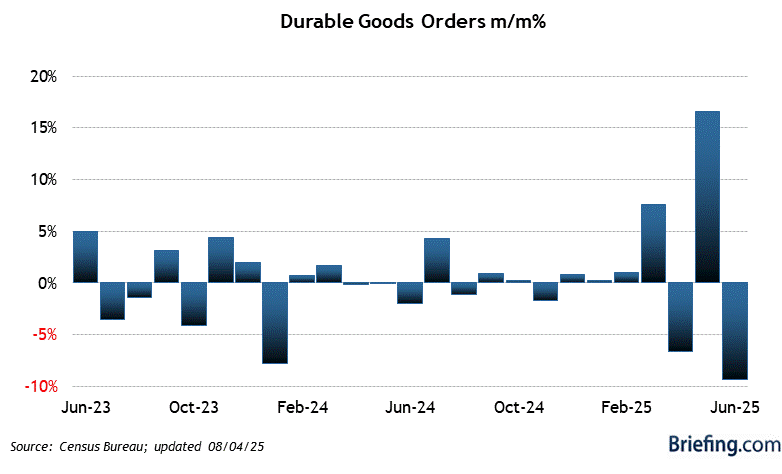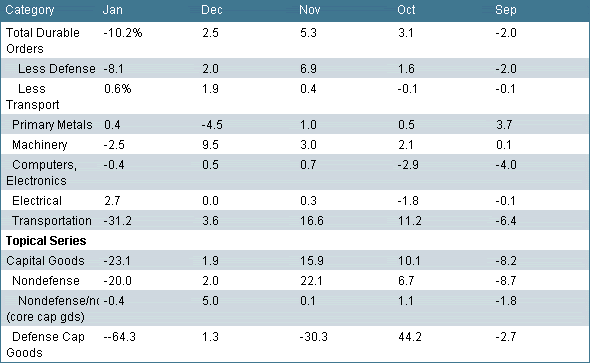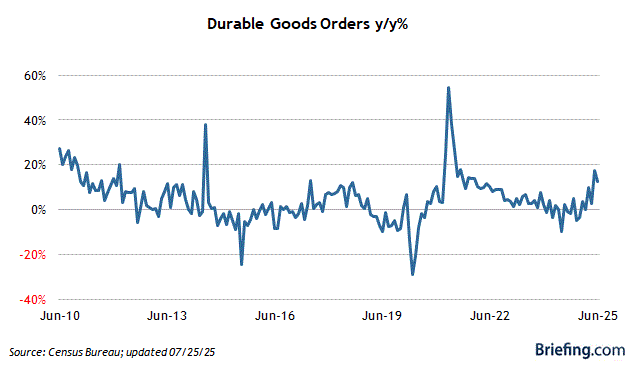| USA Politics |
| Reply to Thread New Thread |
|
|
|
|
#1 |
|
|
Friday's Durable Orders showed a huge monthly decline, marking a -10.2% change from the previous month. Not only did Durable Orders decline sharply, the decline was MUCH worse than predicted by the "experts." As of Monday, February 20th, the Market anticipated only a -0.3% change in Durable Orders. By Thursday, February 23rd, the anticipated decline had been revised further to -2.0%. The actual -10.2% change was markedly worse than expected. Below is a graphic representation of this decline.
 Below is a copy from Briefing.com showing the actual numbers.  This information can also be found at Briefing.com's Durable Orders Non-defense durable orders declined 8.1%. Capital goods orders fell even more, with a 1 month change of -23.1%. (The previous day's prediction was for a change of only 0.0%. Off just a little.) Most of this change was in Nondefense Capital goods, which experienced a -20.0% change from the previous month. (The previous day's anticipated change was only -0.2%. Again, off by a just a tad.) Machinery orders declined 2.5%. The capital goods order decline of 23% suggests a similar decline in true capital investment. It indicates a huge decline in demand for capital goods, as well as a decline in demand for production those capital goods facilitate. These numbers are NOT indicative of an economy that is "strong, and getting stronger." They're indicative of an economy that is "weak, and getting weaker." They're indicative of an economy that's sinking. And sinking rapidly. unlawflcombatnt EconomicPopulistCommentary Economic Patriot Forum The economy needs balance between the "means of production" & "means of consumption." |
|
|
|
|
#3 |
|
|
Typical economic naysayer's cherrypicking of data and looking at ONLY the most pessemistic possible perspective
What you present is the MONTHLY change (and you interestingly left out the upward revision of the December numbers). However, if you look at the Year-on-Year data, the situation looks far less pessimistic:  And let's look at the ANALYSIS provided by the experts at briefing.com (which you also ignore, substituting instead your own perspective): Highlights Actual: -10.2%, 0.6% ex-transportation Key Factors -Strong drop-off belies growth ex-trans with big upward revisions to Dec (1.9% from 0.9%). -Large drop in nondefense aircraft/parts -68.2% and defense -64.3% provide downward direction. -Transportation orders drop -31.2% after the 32% Q4 surge. -Non-transportation orders continue to hold gains +0.6% after two months of positive numbers. -Machinery orders decline -2.5% after the 12% Q4 gain. -Computers and electricals edge lower -0.4%. -Non-defense capital goods orders (i.e. business investment) fell modestly -0.4%. Big Picture -Business (capital goods) investment strengthened in 2005 through the end of capital investment tax incentives, the Sept energy price spike and the temporary dip in business confidence. The year ended with orders at 13% yoy and non-defense capital goods orders at a stunning 32%. Briefing.com has a strong 2006 outlook given strong corporate profits, large cash flow, low borrowing rates and underlying business demand. High energy prices offer a partial counter to the strong fundamentals given the potential for crowding out of business investment. Most of the drop was due to a single sector (transport) and that sector showed a monthly decline only after a huge SURGE in Q4 (not an unusual cyclical event). And the overall outlook for 2006 by briefing.com is "strong". Go figure |
|
|
|
|
#4 |
|
|
Boo hoo, the economy this, the economy that, wha wha wha, wheres my baba?
Here's an idea!  Lets pass a law making it illegal for the orders of durable goods to ever go down. while we are at it we can stop all cycles of the economy. Lets pass a law making it illegal for the orders of durable goods to ever go down. while we are at it we can stop all cycles of the economy. Lets make all property public!! Lets make all property public!!  no more economic worries!! a chicken in every pot, 40 acres and a mule!! no more economic worries!! a chicken in every pot, 40 acres and a mule!!    whooohoo!! it'll be a workers paradise!!! whooohoo!! it'll be a workers paradise!!! 
|
|
|
|
|
#5 |
|
|
|
|
|
|
|
#6 |
|
|
The plunge in durable goods orders was due almost entirely to a dramatic drop in orders for aircraft, a number which fluctuates wildly from month to month:
This is taken from "Marketwatch" website:Aircraft orders fell 68.2% in January after averaging more than three times the normal level from October through December. Even with the decline, aircraft orders were slightly above average in January. These numbers should never be used for attention grabbing headlines. In fact, orders are up more than 5% on a year-over year basis when compared with January 2005, and even the month of January 2006 showed a smal gain - .6% - when transportation orders are removed. The last three months of 2005 were strong for the airline sector, in terms of new orders and interest from other nations in ordering from the US. The positive results will ripple through the manufacturing sector for several months, but there is always a sharp drop in the orders number following a burst of new orders. The last quarter of 2005 was exceptionally strong for this sector, so the drop was corresepondingly large. So your theory that this number is indicative of the economy as a whole is false. In fact, the current quarter is quite strong, and GDP should rise about a 5-6% rate. There are plenty of problems with the economy - I am the first to admit - but right now the expansion is solid. |
|
|
|
|
#7 |
|
|
The biggest near-term threats to the economy, in this order are:
1. Fed raising short-term rates too high 2. Oil supply shocks Now, the medium term risks in order: 3. Failure to make the tax cuts permanent 4. Failure to get government spending under control Long term risks 5. Explosion of entitlement spending |
|
|
|
|
#8 |
|
|
The biggest near-term threats to the economy, in this order are: |
|
|
|
|
#9 |
|
|
The biggest near-term threats to the economy, in this order are: |
|
|
|
|
#10 |
|
|
|
|
|
|
|
#12 |
|
|
Exactly Alex, and let's make the minimum wage $75,000 a year PLUS and additional $10,000 for each child employees have. Then everyone in the United States can be upper middle class!  Here is a novel idea. Whenever you are paid - pay yourself first. Its really simple, just save a minimum of 10% off the top of every check. Then you won't need to worry about swings in the economy. This should be taught from kindergarten. If you cannot save money, the seeds of greatness are not within you and you are destined to be a loser. |
|
|
|
|
#13 |
|
|
.....These numbers are NOT indicative of an economy that is "strong, and getting stronger." They're indicative of an economy that is "weak, and getting weaker." They're indicative of an economy that's sinking. And sinking rapidly..... 
|
|
|
|
|
#14 |
|
|
If a company goes out of business, or has to downsize, does it only have a negative impact on the owners? Does that qualify as an answer? If so it's over my head. Let's say the various risks listed earlier occur. Several companies close or downsize. Your parents' (former?) empolyers go under completely. Poof - you have no inheritance and possibly a couple new boarders. Your significant other's company downsizes, forcing them to work longer hours. Poof - your social life takes a major hit. Our wonderful forum sponsor is among the economic casualties. Poof - USPOL becomes a pay site, or worse, an ex-site. We're all worse for the lack of intelligent discussion, etc.
And that's just the effects on you, who felt absolutely nothing Directly. Meanwhile, the various janitors, phone operators, cleaning crews, waitresses at nearby restaurants, etc are put on welfare because of the business closings/reductions, increasing your tax burden twice - once with fewer payers sharing the costs and again with increased payouts needing to be covered. There are certainly exceptions, usually that involve corruption, but generally, what's good for business is good for people. |
|
|
|
|
#15 |
|
|
Let's say the various risks listed earlier occur. Several companies close or downsize. Your parents' (former?) empolyers go under completely. Poof - you have no inheritance and possibly a couple new boarders. Your significant other's company downsizes, forcing them to work longer hours. Poof - your social life takes a major hit. Our wonderful forum sponsor is among the economic casualties. Poof - USPOL becomes a pay site, or worse, an ex-site. We're all worse for the lack of intelligent discussion, etc. |
|
|
|
|
#16 |
|
|
|
|
|
|
|
#17 |
|
|
Ya just gotta love this "The Sky Is Falling!" mantra that has been being screamed every since Bush #2 became president. But what does this have to with my question? |
|
|
|
|
#18 |
|
|
timj219
So if I understand correctly - stockholders and business owners do = the "economy" and things like jobs and good wages are a byproduct of ensuring that conditions remain good for them? Almost, but not quite right. What drives growth in the economy are investors/risk takers who create new wealth (for both themselves and others). Jobs, wages, products, services are what economists refer to as an external benefit of that pursuit. People don't start businesses to create jobs, the do it to create wealth for themselves, but it creates the external benefit of jobs and goods/services to others nonetheless. |
|
|
|
|
#19 |
|
|
Almost, but not quite right. What drives growth in the economy are investors/risk takers who create new wealth (for both themselves and others). Jobs, wages, products, services are what economists refer to as an external benefit of that pursuit. People don't start businesses to create jobs, the do it to create wealth for themselves, but it creates the external benefit of jobs and goods/services to others nonetheless. With that caveat, I guess it seems backward to me. You claim that it is investors who drive the economy but is that really true? Isn't it really the productivity of the other 95% of the people who receive wages that drives the economy? I think measuring the health of the economy strictly in terms of what benefits owners and investors is a poor idea. The numbers we should be paying attention to are the ones which show changes in the lives of wage workers. After all, investors and multinational corporations have no loyalty to this country. When it comes to a choice between a healthy bottom line or a healthy america, corporations must, by there very nature, follow the money. Workers are the ones who have a stake in the security, health, and well being of our country. They are the ones whose welfare should be measured when deciding what is a "strong" economy. If we did it that way, there would be no such thing s a "jobless recovery." |
|
|
|
|
#20 |
|
|
While we're on the subject I've got to say economics reminds me of astrology. If you listen to 10 economists you can get 10 different opinions about what the economy is doing, has done, and is going to do. If they burned a little incense you'd swear you were visiting "the mysterious madame roux" for a reading.
|
|
|
| Reply to Thread New Thread |
«
Previous Thread
|
Next Thread
»
| Currently Active Users Viewing This Thread: 1 (0 members and 1 guests) | |
|
|






 Hybrid Mode
Hybrid Mode

